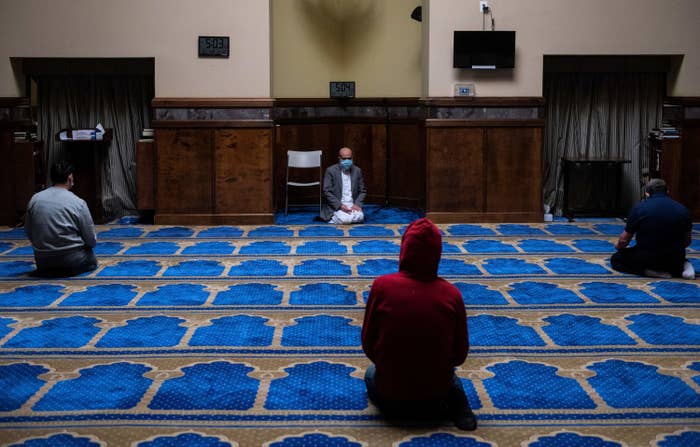
BuzzFeed News has reporters across five continents bringing you trustworthy stories about the impact of the coronavirus. To help keep this news free, become a member and sign up for our newsletter, Outbreak Today.
Al Haj Shah was feeling dazed and sleepy. He had a headache from breathing beneath a mask all day, and he hadn’t eaten since the night before. Talking to his boss took almost too much energy to manage, and earlier that day his colleague had jokingly asked him if he was having a stroke.
Shah is a nurse practitioner working in the emergency department of Weill Cornell Medical Center at NewYork-Presbyterian Hospital in New York City, one of the worst-hit regions in the global coronavirus crisis. The 27-year-old sees patients with COVID-19 (the disease caused by the novel coronavirus) every day, and he’s constantly having to think on his feet. He was also in his first week of fasting for the sacred month of Ramadan, during which Muslims who are able to abstain from food and water during the daylight hours and practice daily prayers. This year, Ramadan started April 23, just as the number of coronavirus-related deaths was starting to dip in New York, and it will last until the major holiday of Eid al-Fitr on May 23.
While a month of fasting is never easy — that is part of the point of the practice — observing Ramadan will be harder this year for many Muslims, during a time of immense stress and social isolation — and long, busy schedules for essential workers.
“This first week of fasting has been crazy,” Shah told BuzzFeed News from his apartment on his day off, six days into Ramadan.
“Wearing a mask all day, fasting or not, takes a toll on your body,” he said slowly, audibly lethargic. “You’re breathing your own oxygen back pretty much; you're inhaling much more CO2. And when you get a headache and you can’t drink water, it just adds fuel to the fire. It’s been rough.”
During the first week of Ramadan, BuzzFeed News asked Muslims in the US and abroad how they plan on observing Ramadan this year, how they’re feeling about it, and how it’s been so far. Thirty-eight people in 6 countries (including Morocco, the Netherlands, and Indonesia) and 12 US states responded, half of whom said they were essential workers.
Nearly all of the respondents said they had concerns or apprehensions about Ramadan overlapping with the height of the pandemic. Many said they felt isolated from their friends, family, and Muslim communities. None of the respondents said they were going to their mosques during the holiday (most mosques in the US are closed due to the pandemic, and some are playing a version of the call to prayer that tells people to stay home), and most of them said they dearly missed it. Praying with an imam via a livestream, they said, is just not the same as being surrounded by people praying alongside you.
Some expressed concern about fasting during a time when having a strong immune system is at its utmost importance. Though you are allowed to postpone your fast if you are sick, some worried that being hungry and dehydrated could put those who are exposed to the virus at greater risk, or give those who have it (and may not know) worse symptoms. Others said they were worried about being able to obtain halal meats when access to food can be limited by panic hoarding, delivery interruptions, and travel restrictions. For many, the month ahead is daunting.
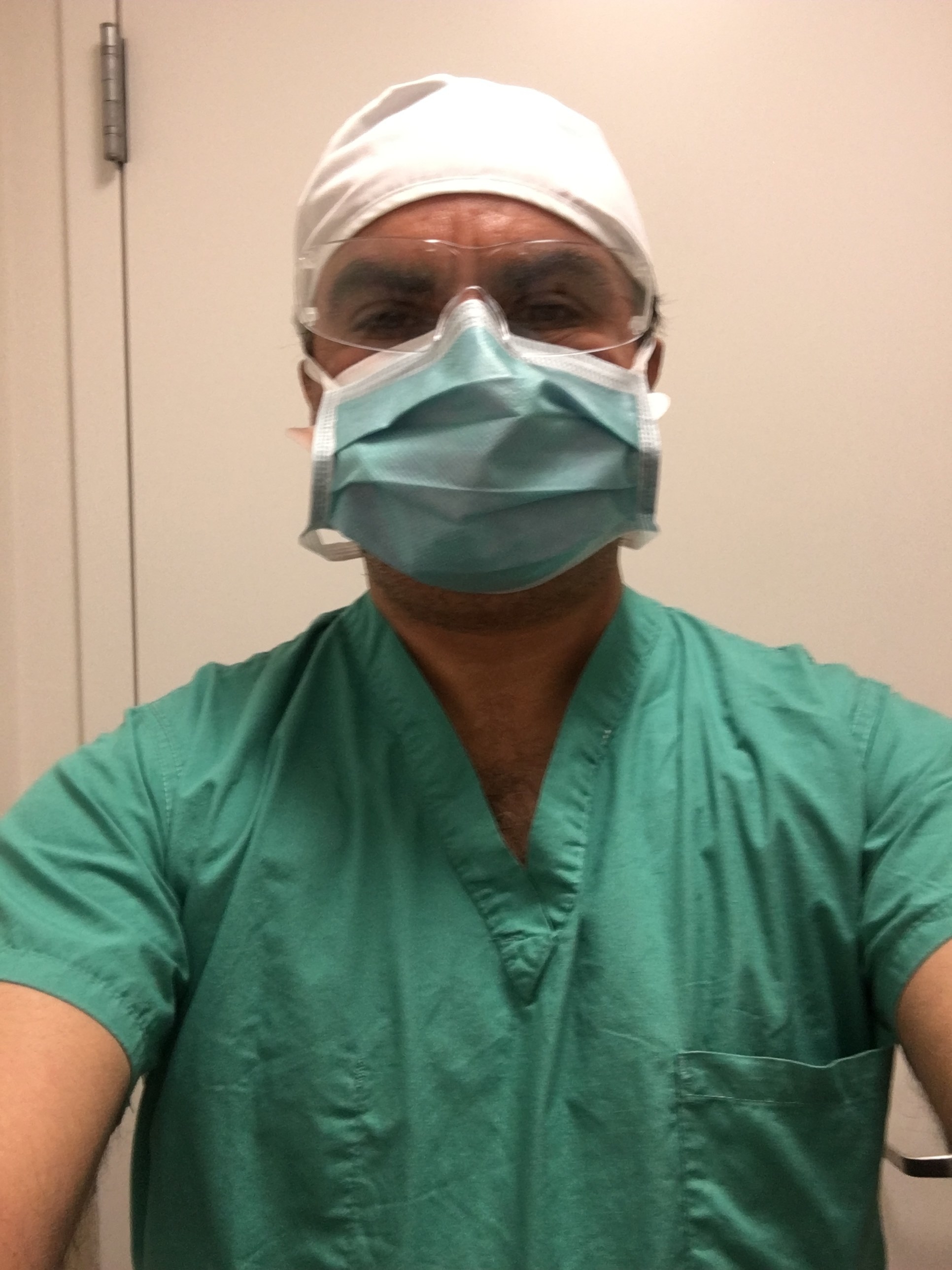
“In some ways it’s not that different. There are days working in the [intensive care unit] when, whether we’re fasting or not, we don’t get to eat or drink all day long. But if I’m dehydrated, if I’m weak from hunger, my immunity is weaker,” Mustafa Salehmohamed, a pulmonary critical care physician, who works shifts in the intensive care unit treating coronavirus patients at a hospital in Queens told BuzzFeed News.
Because of his exposure to patients with COVID-19, Salehmohamed has had to self-quarantine from his wife and two daughters during Ramadan. He stays upstairs in his house, living only on the top floor, while his family stays downstairs, his wife sleeping in their kids’ room. For iftar, his family brings him plates of food and leaves it outside his door, and the younger daughter, an 8-year-old, sometimes brings him drawings she’s made. Occasionally the whole family will eat together, sitting on the floor — him at the door of his room and them at the other side of the hallway — safely distanced in their own home. Other times he eats alone.
The month of Ramadan is about prayer, connection to God, and connection to community. Large gatherings in the mosque, communal prayer, and nightly meals with friends and family breaking the day’s fast (called iftar) are important parts of the holiday that many Muslims all over the world cannot participate in due to stay-at-home orders and social distancing.
But the month is also about self-reflection, self-improvement, understanding the suffering of those less fortunate who regularly go without food and water, and giving back to your community and neighbors, the people observing Ramadan who spoke to BuzzFeed News said. One-third of the global population is currently under a lockdown, and some respondents said they now have more time for self-reflection and meditating on the suffering of others. hough they were sad to be isolated from their mosque and their families, four people wrote that the time alone has given them peace, more time to read the Qur’an, and time to focus on their prayers.
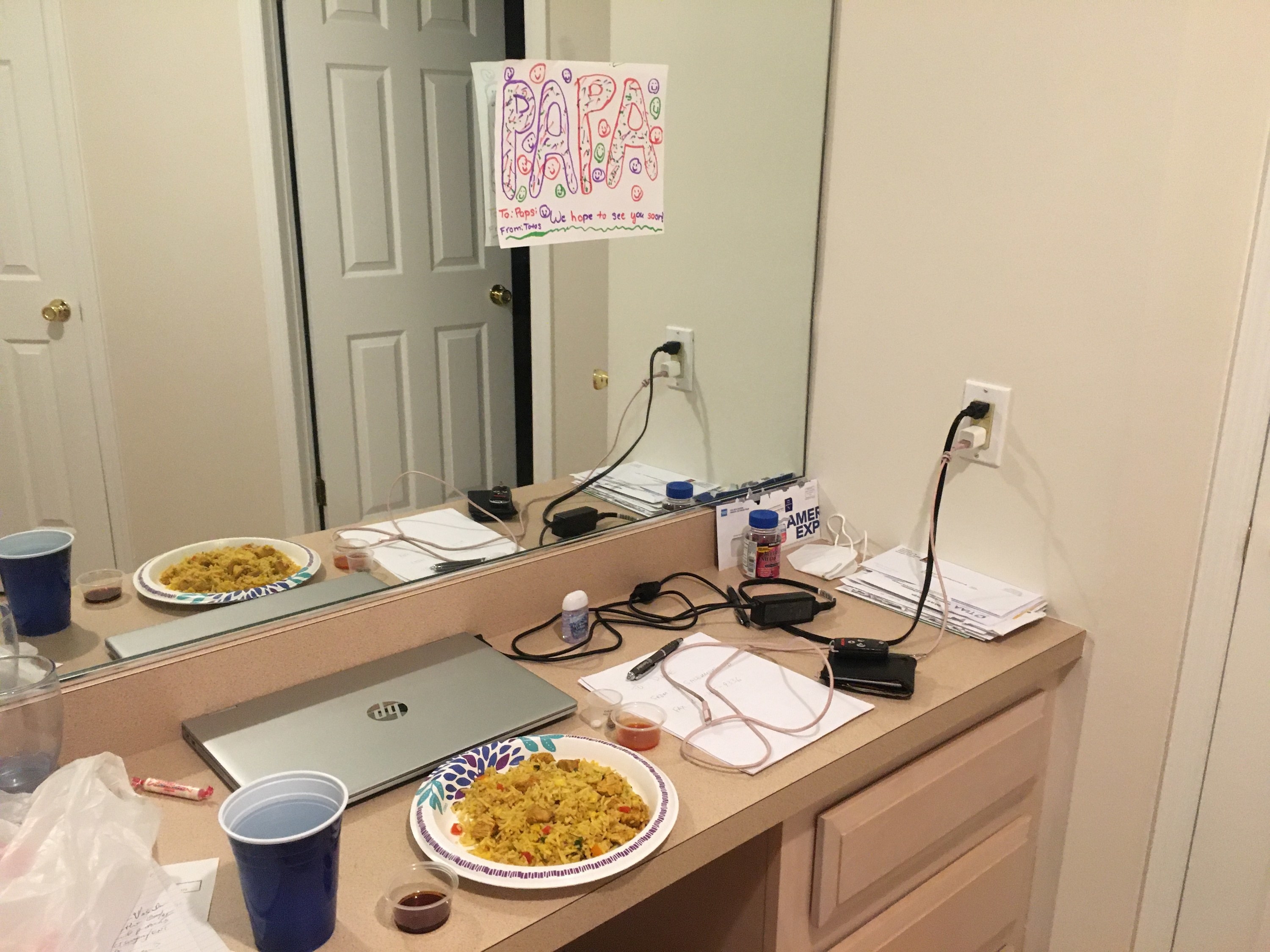
“I am looking forward to the calmness it brings,” Marwa Saeed, a family physician based in West Midlands, England, wrote to BuzzFeed News. “[I am] a bit apprehensive as it will be a unique Ramadhan, but hopeful that it will make us appreciate our blessings even more, and connect us more closely to our Creator.”
An 18-year-old in New York City who asked to remain anonymous wrote to BuzzFeed News that both Ramadan and obeying the stay-at-home orders are about patience and respect for others.
“Ramadan teaches all people about patience. We stay patient for Iftar, when we can break our fast. We also stay patient for Eid-ul-Fitr, the end of Ramadan, as it is a time of joy,” they wrote. “This is an important lesson for the quarantine that we are in. We need to stay hopeful, follow medical guidance and pray that our world and all of its beloved people heal.”
In March, the National Muslim Task Force issued a statement that urged Muslims in North America to follow local protocols for self-quarantine and social distancing and requested that congregational prayers be suspended. Islam has a specific guidance, or hadith, on plagues, which is pretty similar to the recommendations being given by governments during the pandemic: “If you hear of a plague in a land, then do not go into it,” the hadith reads. “If it happens in land where you are, then do not go out of it.”
As one of the Five Pillars of Islam, fasting is obligatory, but it does not apply to those for whom fasting would put their health at risk. The elderly, people who are immunocompromised, who are sick, and people who are pregnant are traditionally allowed not to fast. Those who can’t fast on certain days for other reasons (for example, people who are menstruating are not allowed to fast) can make up for those missed days by fasting later in the year.
In early April, a group of Muslim religious scholars in the UK signed a fatwa — a ruling on a point of Islamic law — giving Muslim medical workers permission to postpone fasting during the pandemic. Three medical workers told BuzzFeed News they plan to try to fast for Ramadan this year, but if they feel it is putting their health or their patients at risk, they may have to make up those days at a less chaotic time.
“I will fast those times when I’m not in the ICU, and I’ll have to see what happens if I do further shifts in the ICU,” Salehmohamed told BuzzFeed News the day before Ramadan began. “There is always the flexibility. If I’m in between and I’m feeling weak, then I can discontinue the fast.”
Aminat Sarumi, a 28-year-old flight attendant who lives in Virginia, near Dulles International Airport in Washington, DC, told BuzzFeed News that Ramadan is so “quiet” this year due to the pandemic and she sometimes forgets it’s even happening.
“Normally I have my routine — going to the mosque to pray each day, iftar with my friends — but this year, nothing,” she said.
She is only in her first year of being a flight attendant and usually she is only on reserve — meaning she is the backup crew in case a flight is severely delayed and the primary crew can’t make it. But so many of her coworkers have been calling in sick and taking time off work, she’s been working nonstop.
“Sometimes I’ll only have three people on the whole flight, but Thursday morning I had a red-eye from San Francisco to Dulles, and there were about 50 people on board,” she said emphatically, clicking her tongue in disapproval. “I don’t know why people are flying. It boggles my brain. If I weren’t a flight attendant, I wouldn’t be flying right now. Honestly I wouldn’t be mad if I didn’t have a job right now.”
The red-eye was so busy, she said, she forgot she was fasting. Suhoor — the predawn meal eaten during Ramadan to make the day’s fast easier — ends at 4:55 a.m. on the East Coast, she said. On that flight, she’d forgotten she was supposed to fast that day until she saw her watch read 4:54 a.m. She was too late.
“Then I accidentally took a swig of water,” she said, sighing. “Not drinking water on a plane, it’s tough.”
On the flip side, several people who shared their stories with BuzzFeed News said they were concerned about being able to access the food they need to break fast, especially halal meats. Panic shopping, hoarding, and food delivery and supply chain interruptions have caused stocking issues at grocery stores across the country. For many Muslims in areas where Islam is not the predominant religion, access to halal meats (“halal” meaning “permissible”) can be limited even during typical circumstances.
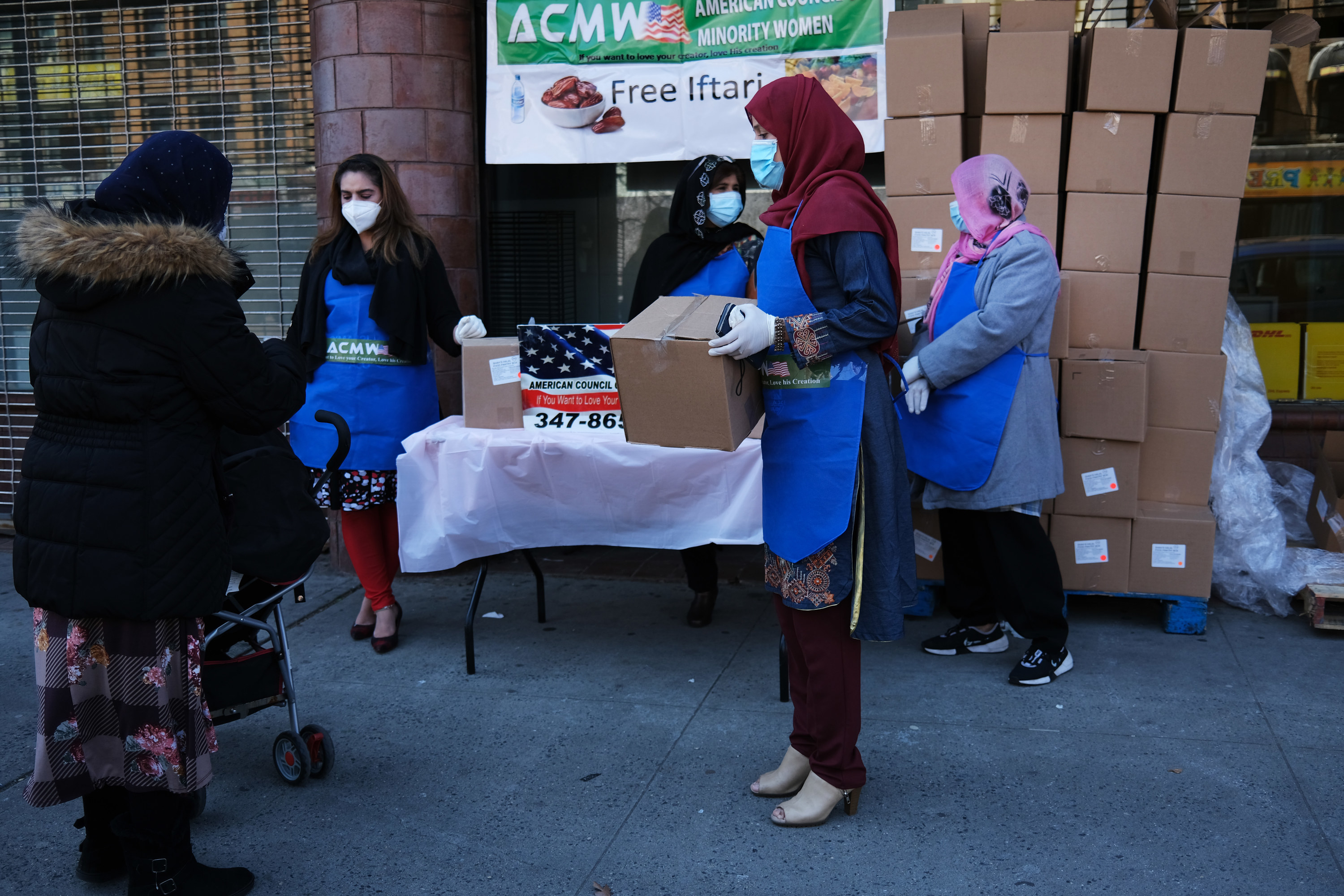
A Philadelphia-based social worker named Deven told BuzzFeed News she is working with her local Islamic center to make “grab-and-go iftars.” Using gloves and masks, she and a few other volunteers package food made earlier in the day to hand out to those who come by the mosque in the early evening. In New York, ICNA Relief, a national aid group, is handing “halal groceries” out to families in 13 states every week. Dr. Ramon Tallaj, chair of SOMOS Community Care, has been helping to provide food for Muslim families in Washington Heights.
Shah, the nurse practitioner in New York, however, has been biking miles to try to access halal meats — and when that’s not possible, he has been taking the subway to a neighborhood far from home.
“I try to be cognizant of my distance and being around in the subways,” he told BuzzFeed News. “I haven’t had any luck finding halal meat in Manhattan, so I go to Astoria where I’m comfortable and I know where it is. It’s risky, but it’s either that or don’t eat, so pick your poison.”
Shah only moved to New York in October 2019. Born in Afghanistan, he moved to Atlanta with his family in 2008. New York in lockdown, with Times Square empty and restaurants closed, is not what he imagined the city would be like. But he still loves it, he said. When he was young he wanted to be a war journalist, so working in the emergency department in the center of a global pandemic feels aligned with his lifelong desire to be on the front lines.
“Whenever there would be some sort of bombing or something, my 10-year-old self would make it there and try to analyze the situation,” Shah said. “I’ve always wanted to be in the middle of things, so even though it’s so scary I’m glad to be here witnessing it and getting to understand it from the inside.”
Like most of the people who wrote to BuzzFeed News, Shah said he was greatly missing the community aspect of Ramadan. His family is still in Atlanta, and he had just started to make friends in his new city via the Islamic Center at New York University. He was looking forward to observing Ramadan with his new community. But that was cut short.
“Every year it is an exciting time for my family, friends and community. I'm sad that this year we aren't able to be together like we are used to,” Deven, the Philadelphia-based social worker, wrote. She is still visiting people’s homes as part of her job and has to be very careful about her contact. “I feel like a part of me is missing, and I'm worried how others are surviving.”
Medina Khedir, a project coordinator at a community health clinic in Seattle — the first city in the US hit hard by the coronavirus — has fortunately not had to isolate from her family. The 24-year-old lives with her parents and four younger siblings (“It’s always loud,” she said), and her father has been leading them in the daily prayer during Ramadan. But she still misses her mosque youth group. They’ve been meeting up via video chat to talk about Ramadan, God, and their lives in general, but it’s not the same.
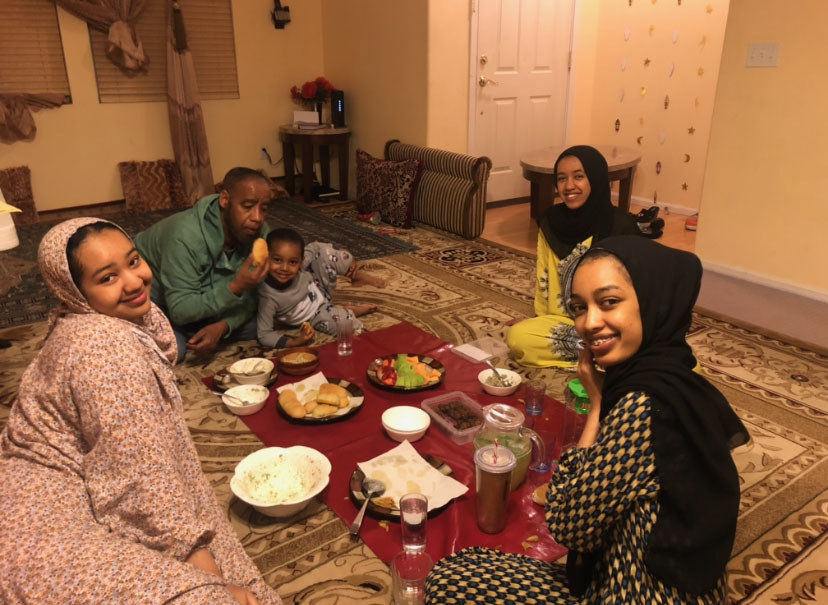
Everyone who spoke to BuzzFeed News said that not being able to celebrate Eid properly will be even worse. The holiday often involves big gatherings and a lot of shared food, going all day and into the night. Normally, Khedir’s family goes to a big congregation held at a local high school football field and then (after her family’s traditional Eid nap) spends the day hanging out with friends and eating barbeque in the park.
“I can’t imagine it, honestly,” Khedir said. “We’re all trying to mentally prepare for not having a proper Eid, and I think we’ve all come to the conclusion that it might not happen, but that won’t make it any less sad.”
Some people have been trying to find workarounds; breaking fast with friends and family over video chat, holding prayer meetings online. One person told BuzzFeed News that they have put Ramadan decorations on a wall behind them for Zoom chats with friends and family, and Rami Ismail, a video game developer based in the Netherlands, has been hosting iftars and suhoors nearly every night of Ramadan on Animal Crossing, a video game that has been getting many people through the pandemic.
Shah and Sarumi, the flight attendant in Virginia, both live far from their families and told BuzzFeed News they are taking the last week of May off and are still hoping to be able to fly home to visit their families for the holiday. But nearly in the same breath, they acknowledged how unlikely that might be. Even if most states begin to open up this month, it will be slow; people who are regularly exposed to the virus, like them, will likely still be encouraged not to have close contact with older, more vulnerable family members.
“Ramadan is a time of reflection where you’re supposed to be peaceful, kind, patient, honest. I’m just praying for the goodness of the world, and I’m sure other Muslims are, too,” Sarumi told BuzzFeed News from her apartment complex near the airport. “I’m not praying for things to return to normal, because we’re not gonna get back to what people thought was normal. So I’m just praying for a leveling out of everything. I’m sure Ramadan will bring that.”
